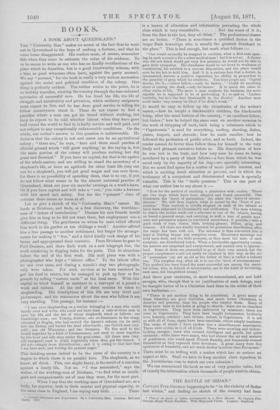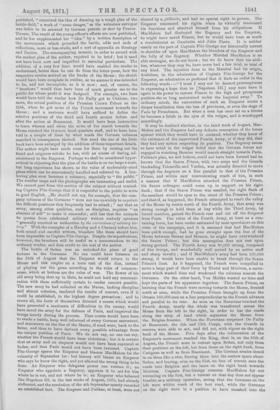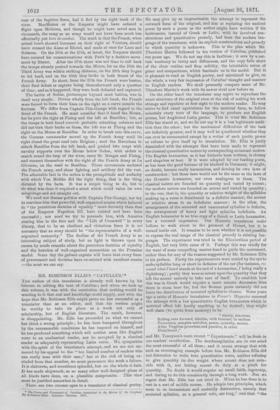THE BATTLE OF SEDAN.* CAPTAIN FITZ-GEORGE happening to be "in
the vicinity of Sedan last winter," and finding no sketch of the country had been
* Plan of the Battle of Sedan, accompanied by a Short Memoir. By Oaptuis Fitz- Ooorgo, Royal Welch Fusiliers, With Maps and Views. London: Stanford. published, " conceived the idea of drawing up a rough, plan of the battle-field," a work of " some danger," as the volunteer surveyor was liable to be arrested by German patrols or shot by Francs- Tireure. The result of the young officer's efforts are now published, and he has supplemented his " idea " by a written description of the movements which preceded the battle, odds and ends of reflections, more or less crude, and a sort of appendix on Strategy and Tactics. The accompanying memoir, in order to accord with the modest plan of the author, required to be brief ; but it need not have been curt and imperfect in essential particulars. The addition of a very few lines would have enabled the reader to understand, better than he can do from the letter-press, how the respective armies arrived on the banks of the Meuse ; the sketch would have been complete in outline, as we assume it was intended to be, and not incomplete, as it is now ; and, of course, the " brochure " would then have been of much greater use to the public for whose profit it was designed. For example, two lines would have told the reader how De Failly got to Chalons; two more, the actual position of the Prussian Crown Prince on the 25th, when he got news of the French movement towards the Meuse ; and a sentence would have sufficed to define the relative positions of the third and fourth armies before and after the action at Beaumont. It would have been instructive to learn whence and when the news of the march towards the Meuse reached the German head-quarters staff, and to have been told in a couple of lines by what roads the German columns marched in consequence thereof. Nor need the size of the little book have been enlarged by the addition of these important details. The author might have made room for them by cutting out the timid and exiguous rebuke he has, with an access of daring, ad- ministered to the Emperor. Perhaps we shall be considered hyper- critical in objecting that the plan of the battle is on too large a scale, but long experience has shown us the value of moderately-sized plans which can be conveniently handled and referred to. A lum- bering plan soon becomes a nuisance, especially to " the public." The smaller maps and the photographs. are interesting and useful. We cannot part from this section of the subject without remind- ing Captain Fitz-George that it is respectful to the public to write in good English. , He should not say, for example, that the com- pany columns of the Germans " were not too unwieldy to negotiate the difficult positions they frequently had to attack ; " nor that an army, among other qualities, such as discipline, requires " an absence of self" to make it successful; still less that the extracts he quotes from celebrated military writers embody opinions "generally received as authorities by the curriculum of military his- tory." With the examples of a Hamley and a Chesney before him, both sound and careful writers, blunders like these should have been impossible to Captain Fitz-George. Despite its imperfections, however, the brochure will be useful as a memorandum to the ordinary reader, and does credit to the zeal of the author.
The battle of Sedan was an unlooked-for piece of good fortune to the Germans. No one could have foreseen on the 24th of August that the Emperor would return to the Meuse and risk empire on a mere cast of the dice, instead of playing out the game according to the rules of common- sense, which at bottom are the rules of war. The flower of his old army being shut up in Metz, he could not hold any communi- cation with them sufficiently certain to render concert possible. The new army he had collected on the Marne, lacking discipline and almost cohesion, rendered the results of concert, even if it could be established, in the highest degree precarious ; and to crown all, the facts of themselves dictated a course which would have presented a maximum of difficulties to the enemy, would have saved the army for the defence of Paris, and improved the troops hourly during the process. That course would have been to evade a battle, keep well informed of every Gorman movement, and manoeuvre on the line of the Marne, if need were, back to the Seine, and then to have derived every possible advantage from the unique position of Paris. We do not say, no one can say, whether the French would have been victorious ; but it is certain that an army and an emperor would not have been captured at Sedan, and that Paris would not have been invested. Captain Fitz-George spares the Emperor and blames MacMahon for the calamity of September let ; but history will blame an Emperor who says he knew the right, and yet allowed the wrong thing to be done. An Emperor who delegates power can resume it ; an Emperor who appoints a Regency, appoints it to act for him where he is not, and not where he is ; an Emperor who behaved like Napoleon III, in the last weeks of August, 1870, had already abdicated, and the revolution of the 4th September merely recorded an established fact. The Empress and Palikao, at least, were not
elected by a plebiscite, and had no special right to govern. The Emperor renounced his rights when he virtually renounced his functions and absolved himself from his obligations. If Macalahon had disobeyed the Regency and the Emperor, be might have saved France, but he would have been as much a revolutionist as Gambette and Jules Fevre. It is neither manly on the part of Captain Fitz-George nor historically correct to shoulder of upon MacMahon the blunders of the Emperor and the folly of the Regency. Whether Marshal MacMahon is an able strategist, we do not know ; but we do know that his abili- ties, whatever they may be, have never had a fair trial, or trial of any kind. The injustice done to the Marshal had its origin, doubtless, in the admiration of Captain Fitz-George for the
Emperor, an admiration so profound that it finds an outlet in the following words :—" I trust I may not be deemed presumptuous in expressing is hope that he [Napoleon III.] may soon have it again in his power to restore France to the high and prosperous position she so long maintained under the Imperial sway." To ordinary minds, the restoration of such an Emperor seems a deeper humiliation than the loss of provinces, or even the siege of Paris by Frenchmen. But when a man has once eat on a throne he becomes a fetish in the eyes of the vulgar, and is worshipped accordingly. It may be doubted whether, in the third week of August, Mac- Mahon and the Emperor had any definite conception of the forces against which they would have to contend, whether they knew of the existence of the improvised Fourth Army, or if they did, that they had any notion respecting its position. The Regency seems to have acted in the vulgar belief that the German forces not engaged in watching Bazaine would march straight towards Paris. Palikao's plau, we will believe, could not have been formed had he known that the Saxon Prince, with two corps and the Guards blockading Thionville and Verdun, was actually directed to move through the Argonne on a line parallel to that of the Prussian Prince, and within easy concentrating reach of him, in such a manner that if MatiMahou attacked the Prussian Prince, his Saxon colleague could come up in support on his right flank ; that if the Saxon Prince was assailed, the right flank of the assailant would be open to the onset of the Prussian Prince ; and that if, as happened, the French attempted to reach the valley of the Meuse by routes north of the Fourth Army, that army was strong enough to hold them at bay while the Third Army, by forced marches, gained the French rear and cut off the Emperor from Paris. 'rho value of the Fourth Army, at least as a con- taining force, has been under-estimated by most speculators ou this crisis of the campaign, and it is assumed that had alacalahon been quick enough, had he gone straight upon the line of the Meuse between Stoney and Mouzon, he might have overwhelmed the Saxon Prince ; but this assumption does not rest upon strong ground. The Fourth Army was 80,000 strong, composed of fine troops, and wonderfully well served by an active staff and sharp cavalry ; and if MacMahon's army had been 100,000 strong, it would have been unable to break through the Saxon Prince's lines. As it happened, the French were compelled to move a large part of their force by Rhetel and Mazieres, a move- ment which wasted time and weakened the columns nearest the Germans. On the other hand, Von Moltke wasted no time and kept the parts of his apparatus together. The Saxon Prince, on learning that the French were moving towards the Meuse, fronted north at once, while the Prussian Prince brought up from the °main 160,000 men on a line perpendicular to the French advance and parallel to its rear. As soon as the Bavarians touched the Fourth Army, nearly the whole was transferred across the Meuse from the left to the right, iu order to bar the roads along the strip of land which separates the Meuse from the Belgian frontier. When the Bavarians surprised De Ferny at Beaumont, the 5th and 12th Corps, with the Guards in reserve, were able to act, and did act, with vigour on the right
bank of the Meuse. Five days after the information of the Emperor's movement reached the Kiug, that is, on the 30th of
August, the French were in retreat upon Sedan, not only front their positions on the left, but from those on the right bank, from Carignan as well as from Beaumont. The German armies closed in on them like a vice, forcing them into the narrow space about Sedan, and leaving, even on the 31st, no line of retreat save the roads into Belgium end the lanes on the right bank towards Mazieres. Captain Fitz-George censures MacMahon for not retreating on the 81st, but a retreat on that day does not appear feasible as a military operation, seeing that the Germans on the left were within reach of the best road, while the Germans on the right were in a position to have smashed into tuft
rear of the fugitive force, had it fled by the right bank of the river. MacMahon or the Emperor might have ordered a flight upon M6zieres, and though he might have saved men in thousands, the army as an army would not have been much less effectually put hors de combat. The truth is that the French, when actual touch showed Germans on their right at Vouziers, should have crossed the Aisne at Rhetel, and made at once for Laon and Soissons. On the 26th or the 27th, at latest, the Emperor should have secured his communications with Paris by a decisive move- ment by Rhetel. After the 27th there was not time to call back the troops already pushed towards the Meuse, for on the 28th the Third Army was within striking distance, on the 29th they began to hit hard, and on the 30th they broke in both fronts of the French Army. In short, from the 27th the French were beaten, their final defeat or capture being thenceforward only a question of time ; and as it happened, they were both defeated and captured.
The battle of Sedan, picturesque beyond most battles, was in itself very simple. Driven wholly from the left bank, the French were forced to form their lines on the right on a curve outside the fortress. We differ from Captain Fitz-George with regard to the front of the French. He must consider that it faced the Meuse, for he puts the right at Floing and the left at Bazeilles ; but, as the troops in both faced towards probable attacking columns and did not turn their backs on them, the left was at Floing and the right on the Meuse at Bazeilles. In order to break into this curve, the German commander moved up the Fourth Army until its right closed the great road into Belgium ; used the Bavarians to attack Bazeilles from the left bank, and pushed taro corps with cavalry supports over the Meuse below Sedan, with orders to march round the loop of the river, carry St. Meuges and Floing, and connect themselves with the right of the Fourth Army at La Givonne, on the road to Bouillon. These movements enclosed the French army, and sheer fighting and artillery did the rest. The admirable fact in the action is the promptitude and audacity with which Von Moltke did the right thing, that is the thing dictated by the facts. It was a simple thing to do, but to silo what was done it required a mind which could value its own misgivings and act straight out.
We need not discuss politics with Captain Fitz-George, nor try to convince him that powerful; well-organized armies which believed in " the pernicious doctrine of equality " more devoutly than that of the Emperor Napoleon III. have existed and have been successful ; nor need we try to persuade him, with America staring him in the face and the " Life of Cromwell " in every library, that to be an obedient and victorious force it is not necessary that an army should be "the representative of a well-
• organized monarchy." The decline of the French Army is an interesting subject of study, but no light is thrown upon its causes by crude remarks about the pernicious doctrine of equality and the beauties of well-organized monarchies on the Prussian model. Some day the gallant captain will learn that every form of government and doctrine have co-existed with excellent armies —the most we can say.
































 Previous page
Previous page